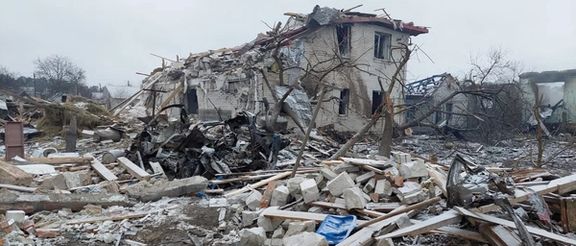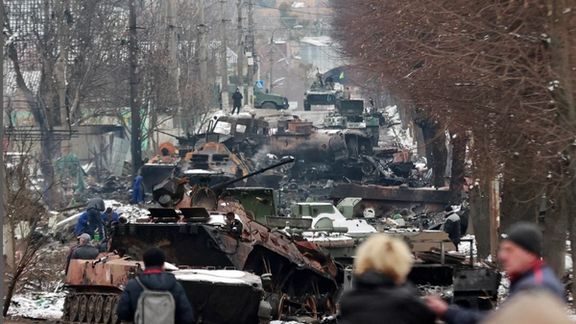Iranians Continue Lively Debate Over Russian Invasion Of Ukraine

Pundits and media in Iran are still heatedly debating the Russian invasion of Ukraine, West's reaction and Iran's official stance of implied support for Russia.
In a televised speech Tuesday, Iran's Supreme Leader detected a ‘colored coup’ in Ukraine, referring to past United States-backed ‘colored revolutions’ in eastern Europe.
Ali Khamenei said Iran was “in favor of stopping the war,” which he blamed on the United States and Nato, following President Ebrahim Raisi earlier explaining the Ukraine crisis in terms of Nato’s eastern expansion, which has taken in 13 countries since 1999.
Iran’s state media and hardliner outlets have avoided using the word ‘invasion,’ while conservative and reformist media have in some instances criticized Russia for the invasion or expressed more nuanced views.
Kayhan newspaper, the hardliner flagship, has blamed Nato and the US. A note published Wednesday contrasted Iranians who defended their country against the 1980 Iraqi invasion, while Ukrainians did not even "pretend to resist as much as a scarecrow" and fled across the borders.
Kayhan’s statement was labeled as an insult to the Ukrainian people on social media, while the comment obviously contrasts with international admiration for Ukrainian people’s resistance.
The conservative Alef has both censured Russia over the invasion and argued out Nato had set Ukraine up as a victim. Like most other countries in the Middle East, Alef said, Iran should remain neutral and try to contribute to a diplomatic solution.

Double standards
Jafar Mohammadi, editor of the conservative Asr-e Iran website, was also nuanced. "Russia's attack on Ukraine is a clear breach of international regulations and a crime against humanity," he wrote Tuesday, while criticizing Nato for failing to stop Russia. Mohammadi also highlighted double standards over Ukrainian refugees compared to Syrians and Afghans, as well as over Israeli occupations and Saudi Arabia bombing cities in Yemen.
"That they have driven the invading Russia to a corner of isolation and sanctions is a very good measure,” Mohammadi wrote. “That's what an aggressor deserves, but they must show the same response to other aggressions, which they don't, and the outcome is an unsafe world in which even the value of children's blood is measured by the color of their eyes.”
Russia appears to see Iran as an ally in the war against Ukraine. The Russian embassy in Tehran Wednesday published on Twitterand Instagram photos from Iran including an Iranian flag with ‘We Support Russia’ in Persian. It claimed these were from a "flash mob of Iranians in support of the Russian army with the sign 'Z'". A few photos published in the tweet do not show a ‘flash mob.”
Blind enmity
In February, some Iranians expressed anger on social media when the Russian embassy honored Alexander Griboyedov – ambassador, promising writer and friend of Aleksandr Pushkin – who along with all the Russian embassy staff was murdered by a Tehran mob in 1829.
Hundreds of Iranians on social media have been expressing anger at the invasion in the past six days and criticizing the government’s position. Some are attacking Supreme Leader Ali Khamenei, calling him a lackey of Russia.
Reformist commentator Sadegh Zibakalam suggested phobia towards the West and "blind ideological enmity" had prevented Iranian officials from having a realistic understanding of developments such as the Ukraine crisis.
For Zibakalam, this explained notions that Ukraine had been “deceived by the West” or that “Western [powers] are responsible for the war because they wanted to expand Nato towards Russia." Zibakalam took it upon himself Tuesday to apologize to Ukrainians for the Iranian government's stance.